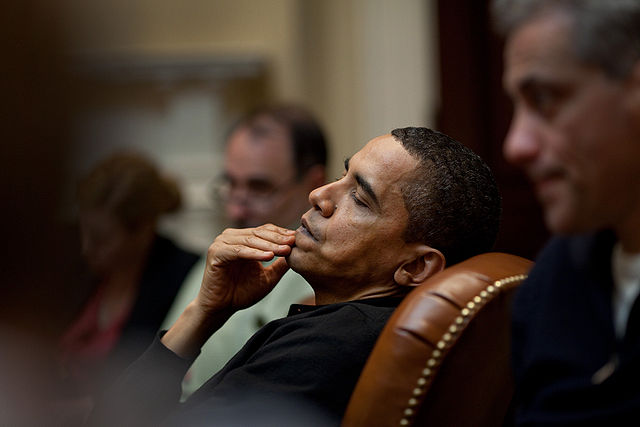by Henry Precht
Secretary John Kerry made an unannounced stop in Baghdad Sunday to press the Iraqis to deny permission for Iranian overflights that might be carrying arms to Syria. There was no immediate word whether the Shia-led government would agree or not. To do so would mean offending Tehran, its semi-ally, and hurting the threatened Syrian regime, which it quietly supports against Sunni rebels.
Kerry’s demand, almost certainly to be quietly rejected by Baghdad, was greeted with approval by the American, strongly anti-Assad press. The Obama Administration was finally able to declare that it was “doing something meaningful” to aid the Syrian rebels and push Bashar al Assad out of Damascus. A gesture, perhaps, useful for buying time and cooling demands for the full commitment of US forces in the conflict. Even more useful in this regard were reports of CIA assistance to the rebels in transporting weapons from Saudi Arabia and Qatar to Assad’s foes. Helping rebels and blocking supplies to Assad reinforce the rhetoric of active American engagement against Damascus.
But are these prudent moves? Does the US posture on the Syrian civil war make long-term sense?
Not if Washington means what it says when it constantly urges peace and harmony for the Middle East. The US — despite denials — is aligning itself with one of its two openly castigated enemies in the region — Sunni fanaticism of the al Qaeda variety — in order to weaken the other: the Iranian clerical regime and its cousin, Hezbollah. Rather than seeking some sort of accord between regime and rebels and restraining the latter’s backers, Obama’s stated policy is to keep the pressure on Assad to yield unconditionally, whatever the cost to his nation.
This policy masks three acute dangers for America in the Middle East.
First, it prolongs the increasingly deadly conflict which has taken tens of thousands of lives, turned over a million Syrians into refugees and is rapidly destroying a diverse community that, albeit ruled by an oppressive dictatorship, was largely at peace. Sunnis, Alawites, Christians — even a handful of Jews — Kurds, wealthy businessmen and rural villagers lived their lives in greater security than their similarly diverse neighbors in Lebanon and Iraq. Syria’s social fabric is now in shreds. The regime that once collaborated with Washington against al Qaeda and brought a measure of stability to Lebanon now finds Obama has turned against it.
Of course, the Assad regime is in part responsible for the ruin of Syria. Its untempered resistance to an outsider-fueled, partly foreign-manned rebellion with a divided leadership means that the dictatorship will not survive intact when the fighting ends. Given the level of violence his forces have inflicted, Assad himself does not deserve to survive. The intensity of the conflict also means that whatever the coloration or shape of a successor regime, the newcomers will have to deal with die-hard Assad loyalists. The same would be true if Assad supporters somehow survive in whole or as a mere remnant. We saw this future prefigured in Iraq and Lebanon after their main battles were over. It is not a future that Washington would have designed or that will prosper its avowed purposes in the region. Bad choices early on mean Washington must live with terrible events later.
A second danger for the US arises from the fact that the Syrian conflict must be seen as part of the larger Sunni-Shia strife that is being waged by Saudi Arabia and its often subsidized allies in mosques and chancelleries in the Arab and Turkish worlds. This struggle is manifested in the massacres that occur with some regularity in Iraq and Pakistan, in the suppressed Shia uprising in Bahrain and in the crackdown on activists in the Arabian Peninsula. Much of this assertion of Sunni dominance is, without doubt, locally fostered. It seems highly probable, however, that Saudi and other Gulf Arab funds are the source of support — much of it openly, some of it covertly.
The US, for a variety of reasons — largely the warmth of relations with cash and oil-rich Saudi Arabia and the domestic influence of Israel – finds itself enlisted with the Sunnis in this spreading conflict. This is not the kind of entanglement Obama’s Washington could have wished for; it is the sort of thinking that the neocons have worked for.
Thirdly, there is the significant byproduct of this sectarian division that has trapped the US: a deep-seated and abiding hostility towards Iran. Saudi Arabia and Israel are determined that Iran will not rise to a position that will threaten their implicitly shared hegemony in the region. It wouldn’t take Iran’s unveiling of an actual nuclear weapon to do that; home grown nuclear power (with the implicit ability to weaponize) would give Tehran prestige that would cast a shadow over Riyadh and Jerusalem. Intolerable for them –- and for Washington’s ambitions.
Worse, the continuing pressure on Tehran and its resistance could bring open warfare led by Israel and the US. Thus, the end of the track of the Syrian war could be a conflict that will work severe damage for American interests far beyond the Middle East.
We can only hope that Obama and his team will find the vision to foresee the unintended wreck that may lie ahead. To be sure, there will be tough congressional and media criticism and active opposition against any American move to relieve the pressure on Assad and join the Russians in promoting compromise between the two sides. The Administration can argue that the overthrow of Assad will mean al Qaeda rule in Damascus, but many will reject that argument. There are no easy choices: ending Syria’s war will mean applying strong pressure on Saudi Arabia and Turkey to cease and desist. It will be messy, but a negotiated truce will slow down the killing and end the drift towards a major war.
The ultimate stakes for regional stability are too high and the continued suffering of the Syria people too great for America to allow the war to continue and probably escalate. The President will have to show uncustomary political courage. We can only hope he will.
Official White House photo by Pete Souza.




